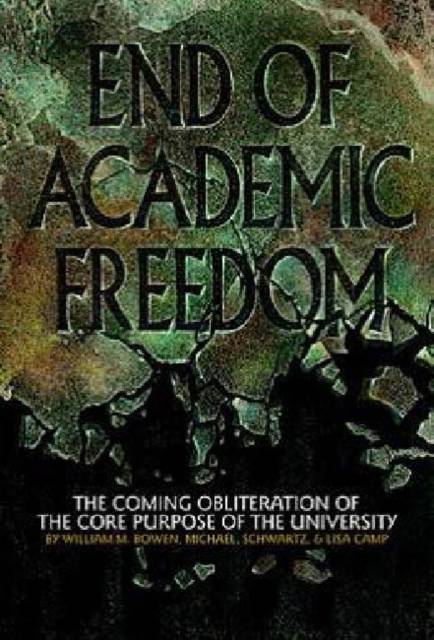
- Afhalen na 1 uur in een winkel met voorraad
- Gratis thuislevering in België vanaf € 30
- Ruim aanbod met 7 miljoen producten
- Afhalen na 1 uur in een winkel met voorraad
- Gratis thuislevering in België vanaf € 30
- Ruim aanbod met 7 miljoen producten
End of Academic Freedom
The Coming Obliteration of the Core Purpose of the University
William M Bowen, Michael Schwartz, Lisa CampOmschrijving
This book is premised upon the assumption that the core purpose of universities is to create, preserve, transmit, validate, and find new applications for knowledge. It is written in the perspective of critical university studies, in which university governance processes should take ideas and discourse about ideas seriously, far more seriously than they are often taken within many of to day's universities, since doing so is the key to achieving this purpose. Specifically, we assert that the best way for universities to take ideas seriously, and so to best achieve their purpose, is to consciously recognize and conserve the entire range of available ideas. Though the current emphasis upon factors such as student headcounts, increased efficiency and job creation are undoubtedly important, far more is at stake in universities than only these factors.
From this premise, we deduce insights and arguments about academic freedom, as well as factors such control and monitoring of the market place of ideas, the structure of information flows within universities, the role of language in university governance, and relationships between administrators, faculty members and students. We identify impediments to achieving the core purpose of universities, including the idea vetting systems of authoritarianism, corporatism, illiberalism, supernaturalism and political correctness. We elucidate how these impediments inhibit successful achievement of the core purpose of the university. In response to these impediments we prescribe relatively autonomous universities characterized by openness, transparency, dissent, and the maintenance of balance between conflicting perspectives, values, and interests.
Specificaties
Betrokkenen
- Auteur(s):
- Uitgeverij:
Inhoud
- Aantal bladzijden:
- 234
- Taal:
- Engels
Eigenschappen
- Productcode (EAN):
- 9781623966591
- Verschijningsdatum:
- 20/03/2014
- Uitvoering:
- Hardcover
- Formaat:
- Genaaid
- Afmetingen:
- 156 mm x 234 mm
- Gewicht:
- 503 g

Alleen bij Standaard Boekhandel
Beoordelingen
We publiceren alleen reviews die voldoen aan de voorwaarden voor reviews. Bekijk onze voorwaarden voor reviews.









